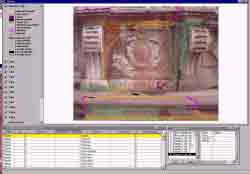

BY Robert Cardillo
I am very excited about the future of the geo-intelligence (GEOINT) community. As a former government official, I am trying to help governments, academia and industry become better partners with each other. I am confident the GEOINT community can make an immense contribution in dealing with challenges concerning global security. As our world becomes more interconnected and interdependent, our community can create new value propositions. Our growth in terms of our capabilities will create a better understanding about what we do as a community, which will lead to more transparency and trust. This trust will then lead to better relationships with other stakeholders.
The US Government is still adjusting its mindset with respect to the broad commercialization of our business, and many of its policies and regulations are outdated. But, the Department of Commerce liberalized the rules for the licensing of Remote Sensing satellites last year. Now that’s the kind of improvement we need. The biggest challenge and greatest opportunity for the GEOINT community is to create value in an open world. Most of the Government’s experience has been around creating value in a closed and classified world. Connecting with the outside world is more of a process for the Government, and that’s where organizations like the United States Geospatial Intelligence Foundation (USGIF) can help bridge the gap.
The Government has to realize that if it does not partner with the industry, it will be difficult for both sides to work together. The historic inhibitors and obstacles that the government put in place for companies, especially newer companies that do not have a history of working on classified programs, will leave the latter focusing on commercial opportunities only. I worry about that because the government will end up missing an opportunity.
When I was the Director of NGA, I focused on the question of cybersecurity within the agency and the government community, because I was worried that while we were aware about cyber threats, we weren’t paying enough attention to it. So, we created the Office of Geospatial Intelligence Assurance, whose role was to build partnerships and perform experiments and technical investigations, to address the question of security. There is no final answer; I think this is a concern that we will continue to face because as soon as you feel you have finally ensured the security of your digital network, you are at risk. In the good old days, you knew that a picture was a picture. You could believe what you saw. Today, we cannot afford to have such a simplistic and outdated view. We have to protect our pixels, and so we have to question the pedigree of those pixels.
What the Government needs is datasets that are verifiable, which means that we are sure that they have been protected. I don’t mean classified, but protected in terms of cybersecurity, so that when the Government uses them, it can be confident that they have not been manipulated.
Emerging technologies, such as Internet of Things (IoT), Artificial Intelligence (AI) and Digital Twin will lead to massive realignment of the geo-intelligence sector
Emerging technologies, such as Internet of Things (IoT), Artificial Intelligence (AI) and Digital Twin will lead to massive realignment of the geo-intelligence sector. We are currently at a stage where we are just scratching the surface of the power of a true Digital Twin, which offers the possibility of better modeling, simulation and testing to evaluate our defense networks. We can make adjustments to make these networks more efficient, so that we can save time and money that can be reallocated.
As we truly immerse ourselves into the Digital Twin, I think we have an opportunity to reimagine societal relationships. And I don’t mean just with business, but questions like how inclusive is a society and how equitably does it share wealth. You can’t deal with a problem you don’t understand, and so, I am optimistic that if we can see the inequity we have a chance to do something about it.
We spend time with the community to work on standard and interface definitions, so that the ones and zeros that are at the base of our profession can communicate, collaborate and connect with each other. But that is only a prerequisite and is not sufficient to achieve intelligence integration. So, we hold pilot projects in which we have working groups comprising people from different wings of our profession. This enables them to create a particular outcome, which could be geographic understanding of a part of our planet, or better comprehension of the science of our profession.
I am very excited about the opportunity to chair USGIF. The Foundation exists to enable and improve the health of the geospatial intelligence profession, and it does that in a number of ways. USGIF follows an academic approach and works with universities and non-profits to make sure that young talent is spotted and nurtured to join the profession in the future. We believe that the better we connect with our partners, the better outcomes we can all achieve. But there is always a bigger target — to create a more integrated community so that we can all share better outcomes.
Robert Cardillo is Chair of United States Geospatial Intelligence Foundation.

Trimble has introduced a software extension to ESRI’s ArcGIS software—Trimble GPS Analyst. Developed in collaboration with ESRI, the GPS Analyst extension allows mapping and GIS professionals to directly process GPS

Four autonomous unmanned aircraft flew simultaneously on pre-determined flight paths at the Reno-Stead Airport using software developed at the University of Nevada, Reno, in collaboration with the NASA Ames Research Center, in a milestone event that included 24 unmanned aircraft at six sites across the country on April 19.
Disclaimer: Views Expressed are Author's Own. Geospatial World May or May Not Endorse it
© Geospatial Media and Communications. All Rights Reserved.